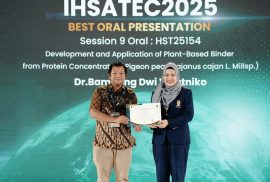
A remarkable achievement has been earned by Dr. Aulia Ardhi, lecturer and researcher at the Department of Food and Agricultural Product Technology, Universitas Gadjah Mada (UGM), who has been honored with the 2025 Chemistry Award (Förderungspreis für Chemie) from the Austrian Chemical Society (GÖCH). This prestigious recognition is granted to early-career scientists for their significant contributions to the advancement and application of chemical sciences.
Dr. Ardhi received the award in Vienna, Austria, on October 17, 2025, from Prof. Dr. Peter Gärtner, President of GÖCH. The award acknowledges his doctoral dissertation at the University of Natural Resources and Life Sciences (BOKU University), Vienna, titled “Nanostructured Lipid Carriers as a Delivery System for Black Seed Oil and Its Application in Beverage.” His research was recognized for its major contribution to food chemistry and nanotechnology, particularly in developing stable and applicable delivery systems for natural bioactive compounds in food products.
Black seed oil (Nigella sativa L.) is known to contain highly valuable bioactive compounds—such as thymoquinone, carotenoids, and tocopherols—with antioxidant and anti-inflammatory properties. However, these compounds are highly sensitive to degradation caused by light, heat, and oxygen. Under the supervision of Priv.-Doz. Dr. Matthias Schreiner (BOKU University) and Prof. Dr. Sri Raharjo (UGM), Dr. Ardhi developed a Nanostructured Lipid Carrier (NLC) system composed of nanosized lipids to enhance the solubility, oxidative stability, and bioaccessibility of thymoquinone.
The NLC system employs a combination of solid and liquid lipids as the dispersed phase with particle sizes below 100 nm. In his study, Dr. Ardhi formulated a blend of glyceryl monostearate and black seed oil, stabilized with Tween 80, a nonionic surfactant, to achieve an efficient and stable system. The resulting NLC formulation slowed thymoquinone degradation by more than twofold compared to conventional emulsions, while maintaining particle clarity and stability when applied to both pure and carbonated apple juice for up to 28 days of storage.
This innovation opens new possibilities for the development of natural-based food and nutraceutical products, especially from herbal resources widely utilized across Asia, including Indonesia. The addition of beta-carotene further improved photoprotective stability, making this technology highly promising for use in functional beverage and herbal supplement industries.
Beyond its scientific contribution, this research aligns with Indonesia’s national priorities in food security, public health, and sustainable utilization of local biodiversity to generate high-value innovative products. “This research faced major challenges, particularly in maintaining thymoquinone stability within the nanosystem when applied to complex beverage matrices like carbonated juice,” said Dr. Ardhi. “Through formulation optimization and a deep understanding of lipid oxidation mechanisms, we identified effective strategies to preserve the compound’s bioactivity.”
“This technology bridges fundamental science and real-world application. With precise lipid chemistry and nanotechnology approaches, natural bioactives can be delivered more stably and effectively without compromising their inherent nature,” he added.
This award underscores the growing presence of young Indonesian scientists on the global stage and highlights the strong research collaboration between Universitas Gadjah Mada and BOKU University in advancing innovation-driven, sustainable scientific research and enhancing Indonesia’s global research competitiveness.
Writer: Firstnandita
Photo: GÖCH Documentation




